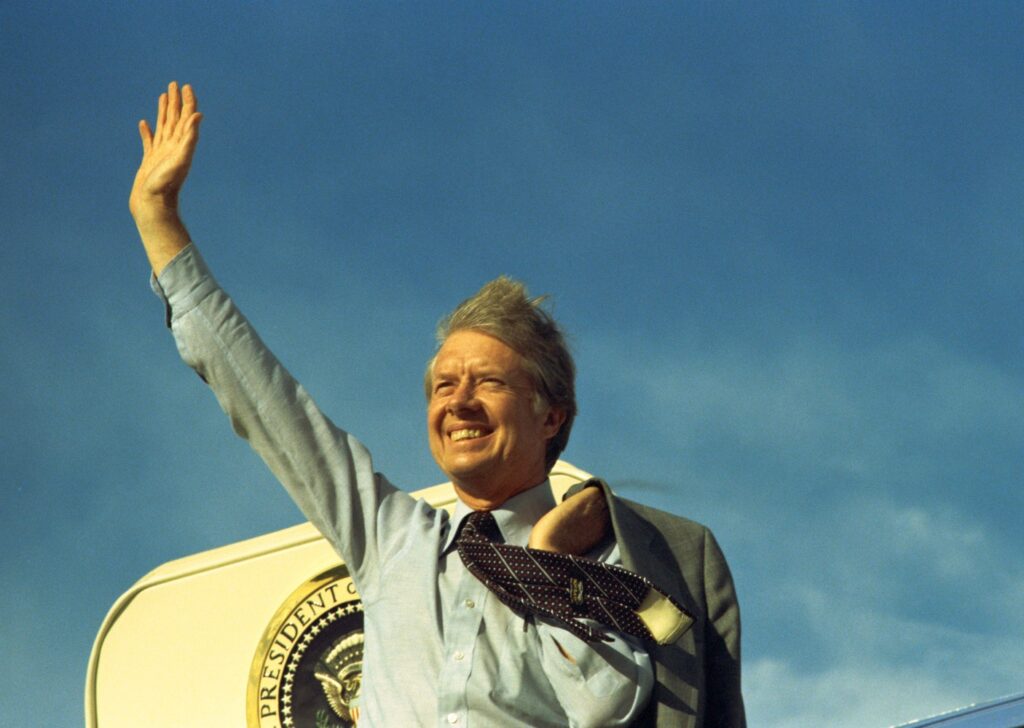RIP Jimmy Carter: Former President Who Lived a Life of Modesty and Dedicated Service

As we join the world in mourning the passing of Jimmy Carter, we reflect on the extraordinary life of a man who was not only the longest-lived president in U.S. history but also one of its most distinguished humanitarians and peacemakers. Jimmy Carter died peacefully at his home in Plains, Georgia, on Sunday, December 29, 2024, at the age of 100, surrounded by his family.
He leaves behind a legacy enriched by his deep commitment to service, both in the United States and globally. President Carter is survived by his children—Jack, Chip, Jeff, and Amy—along with 11 grandchildren and 14 great-grandchildren. His beloved wife, Rosalynn, and one grandchild preceded him in death.
Public observances will take place in Atlanta and Washington, D.C., followed by a private interment in Plains, Georgia.
In this retrospective, we explore how Carter’s return to his humble beginnings shaped his post-presidential years, his relentless efforts in promoting peace and building homes for the needy, and how his life’s work continues to resonate across the globe. Through the words of world leaders, friends, and family, we celebrate a legacy that epitomizes true leadership and compassionate service.

The Peaceful Passing of a Global Icon
Jimmy Carter passed away on Sunday, December 29, 2024, at his cherished home in Plains, Georgia, surrounded by the family he so dearly loved. At the age of 100, his passing marked the conclusion of an extraordinary century-long journey filled with service, compassion, and a relentless commitment to bettering the world. The Carter Center released a statement, describing his final moments as “peaceful” and reflective of the grace and humility that defined his life.
Carter’s hometown of Plains, where his story began, became the sacred ground for his final moments. It was here that he cultivated the values of community and service that would guide him through his life and career. The private nature of his passing stood in stark contrast to the public legacy he left behind—a legacy celebrated not only by the United States but by nations worldwide. In the days following his death, tributes poured in from leaders, celebrities, and everyday citizens, all acknowledging the profound influence of his work and character.
Public observances honoring Carter will take place in Atlanta and Washington, D.C., before a private interment in Plains, Georgia. The commemorations aim to celebrate his life and contributions, inviting the world to reflect on the countless lives touched by his unwavering spirit of generosity and dedication. While his physical presence is no longer among us, the values and compassion he exemplified remain a guiding light for generations to come.
A Modest Life After Presidency
The former president of the United States lived a life markedly different from his successors after leaving the White House. Known for his humility and simplicity, Carter was the only president in the modern era who returned full-time to the house he lived in before his political career—an unassuming two-bedroom ranch in Plains, Georgia. This starkly contrasts with the lifestyles of other former presidents, who often embrace wealth and high-profile opportunities post-presidency.
Reflecting on his life choices, Carter once shared with The Washington Post, “It just never had been my ambition to be rich,” which captured his approach to life after his presidency. Unlike many of his peers, Carter notably declined offers to join corporate boards or engage in lucrative speaking engagements, opting instead for a quieter life focused on service and personal fulfillment. While Carter didn’t see anything wrong with the post-presidential path of capitalizing on White House fame, such pursuits never appealed to him.
His post-presidential years were characterized by a frugality that resonated with his roots and principles. After a challenging presidency that ended with his defeat by Ronald Reagan in 1980, Carter found himself dealing with significant financial challenges. His peanut business, which had been placed in a blind trust during his presidency, was $1 million in debt when he returned to it. Despite these hardships, the Carters managed to rebuild their lives without succumbing to the lucrative financial opportunities that awaited a former president.
Carter’s fiscal responsibility extended to taxpayer savings as well. He cost U.S. taxpayers less than any other ex-president, with annual expenses totaling less than half of what was budgeted for his presidential peers, demonstrating his mindful approach to public service even in retirement.
Even as he aged, Carter’s lifestyle remained consistent. He was active in his community, flying commercial instead of private jets—a rarity among former presidents—and engaging with fellow passengers, often taking selfies and sharing moments with them. His longtime friend and former White House communications director, Gerald Rafshoon, encapsulated Carter’s ethos well: “He doesn’t like big shots, and he doesn’t think he’s a big shot.”

He Lived in a $167,000 Georgia Home
After his presidency, Jimmy Carter returned to a modest ranch-style home in Plains, Georgia, a structure he and his wife Rosalynn first built in 1961. Carter’s return to his roots in a house assessed at only $167,000 reflected his deep connection to his beginnings and his commitment to a humble lifestyle.
The home, simple yet filled with history, became a symbol of the Carters’ frugal and unpretentious life. It sat in a town encapsulated by its past, where Carter’s childhood experiences on a nearby peanut farm shaped his values and aspirations. Living in such a modest home, Carter was a stark contrast to the lavish post-presidential lifestyles often adopted by others. This modesty extended to his and Rosalynn’s personal habits—they were even excited when a Dollar General store opened nearby, appreciating the simple joys and conveniences that aligned with their lifestyle.
The Carters’ home also served as a central point for their community involvement and personal hobbies. Jimmy Carter’s post-presidency was marked not just by his advocacy through his foundation but by the tangible contributions he made with his own hands, such as building furniture and engaging in woodworking right in his garage. His artistic side was also notable, with Rosalynn mentioning that a portrait of a cardinal he painted would serve as their Christmas card.
Their daily routine was a testament to their independence and teamwork. Despite their status, they maintained a DIY lifestyle, cooking for themselves and even making their own yogurt. Rosalynn would mix pancake batter for breakfast, and Jimmy would cook them on the griddle, later taking care of the dishes. This hands-on approach was something they carried into their home’s maintenance as well, having once knocked down a bedroom wall themselves, a skill honed through their extensive work with Habitat for Humanity.
In their later years, the Carters chose to deed their property to the National Park Service, ensuring that their home would eventually be turned into a museum. They planned to be buried on their property under simple stones, near a pond that Jimmy helped dig, adding a personal and poignant touch to their legacy.
The Carter’s life in Plains was a vivid illustration of their choice to live modestly, emphasizing substance over style, service over personal gain, and community well-being over individual luxury. This lifestyle not only defined Jimmy Carter’s post-presidential years but also left a lasting impression on how leadership and legacy are perceived.
A Life Dedicated to Service
Jimmy Carter’s post-presidency years were marked by a dedication to service and activism, setting him apart as one of the most engaged former U.S. presidents. Continuously active, Carter was a regular figure at Maranatha Baptist Church in Plains, Georgia, where he taught Sunday school every other Sunday. In these sessions, Carter’s humility shone through, as he took the time to pose for photos with every attendee, including families who admired his dedication to service.
His commitment extended beyond teaching to tangible contributions through Habitat for Humanity, where alongside his wife Rosalynn, he helped build homes for low-income families worldwide. This hands-on involvement not only highlighted his dedication to combating housing inequality but also inspired a community of volunteers eager to support this cause.
The Carter Center, founded in 1982, also shows Carter’s lasting impact on global peace and health. The center has spearheaded efforts to ensure electoral fairness in over 100 countries and has led public health initiatives that have nearly eradicated diseases like Guinea worm disease in parts of Africa. Through the center, Carter continued his lifelong crusade for human rights, emphasizing the importance of democratic integrity and conflict resolution.
Beyond his organizational involvement, Carter’s personal advocacy for peace earned him the Nobel Peace Prize in 2002, recognizing his efforts to find peaceful solutions to international conflicts, advance democracy, and promote economic and social development. His approach was always hands-on and deeply personal, whether he was teaching, building, or advocating for global peace.

Back in Plains, where Carter lived after his presidency, the community reflects his influence and legacy, attracting thousands of visitors each year eager to learn about his work. The town itself serves as a living museum to his life, preserving the humble ethos and committed spirit of his post-presidential years.
Throughout these years, Jimmy Carter exemplified what it means to live a life of continued public service. Whether through educational efforts, building projects, or global advocacy, Carter demonstrated that his commitment to helping others extended well beyond his time in office. His actions have left a lasting impact on the world, showcasing the significant role a former president can play in ongoing public service and humanitarian efforts.
The World Pays Tribute to Jimmy Carter
Jimmy Carter’s passing at the age of 100 marked the end of an era defined by an extraordinary commitment to peace, humanitarian work, and a modest approach to leadership that resonated worldwide. World leaders and individuals from various nations memorialized him not only as a former U.S. President but as a lifelong peacemaker and advocate for the underprivileged.
U.K. Prime Minister Keir Starmer praised Carter’s efforts in securing the historic Camp David Accords and his unwavering dedication to peace, which culminated in receiving the Nobel Peace Prize. Starmer acknowledged that while Carter’s presidency faced challenges like the Iran hostage crisis, his impactful deeds in the years that followed redefined what it means to serve beyond one’s term in office.
French President Emmanuel Macron also honored Carter, recognizing his steadfast advocacy for the rights of the vulnerable and his relentless pursuit of a more peaceful world.
Throughout his life, Jimmy Carter has been a steadfast advocate for the rights of the most vulnerable and has tirelessly fought for peace. France sends its heartfelt thoughts to his family and to the American people.
— Emmanuel Macron (@EmmanuelMacron) December 29, 2024
This sentiment was echoed by Australian Prime Minister Anthony Albanese, who noted, “Jimmy Carter’s legacy is best measured in lives changed, saved and uplifted,” highlighting his contributions through the Carter Center and Habitat for Humanity.
President Jimmy Carter gave a century of noble service to the country he loved, to the cause of peace and to the lives of people in need all around the world.
— Anthony Albanese (@AlboMP) December 29, 2024
Jimmy Carter was a person of deep faith and a true humanitarian who dedicated his post-Presidential life to eradicating…
Family members shared personal tributes that painted a picture of a man deeply revered not just as a public figure but as a patriarch. His son Chip referred to him as a hero “not only to me but to everyone who believes in peace, human rights, and unselfish love.”
Even political rivals recognized his contributions. Donald Trump acknowledged the challenges Carter faced and commended his efforts to improve American lives. Barack Obama celebrated Carter’s role in brokering the Camp David Accords, his early advocacy for women’s rights and environmental issues, and his unparalleled post-presidency, which included eradicating diseases and promoting global democracy.
Joe Biden and Jill Biden offered a heartfelt homage, describing Carter as a dear friend and a leader of great character and courage. They highlighted his lifelong partnership with Rosalynn, defining it as a testament to love and shared leadership, and encouraged young people to look to Carter as an example of living a purposeful and meaningful life.
In remembrance, Jimmy Carter is celebrated as a model of integrity and humility, whose profound contributions transcended his presidential term and left an indelible mark on both America and the world. His legacy, characterized by his moral clarity and tireless efforts in humanitarian service, continues to inspire and guide future generations.
Featured image courtesy of The Carter Center
Loading...






